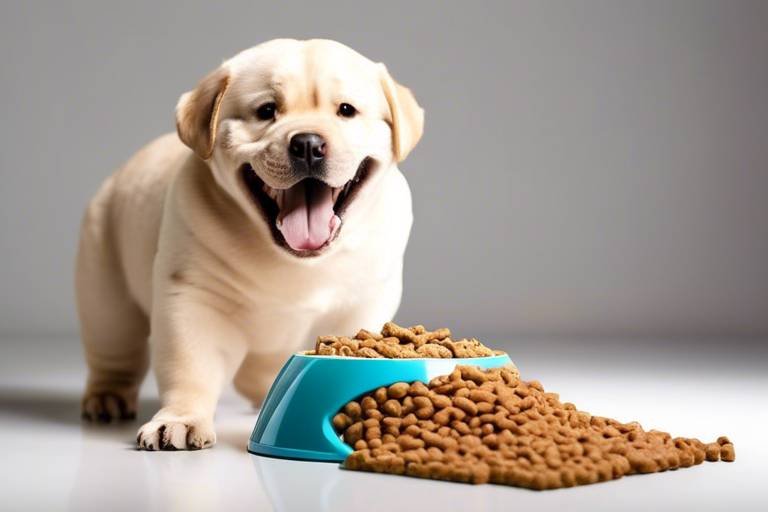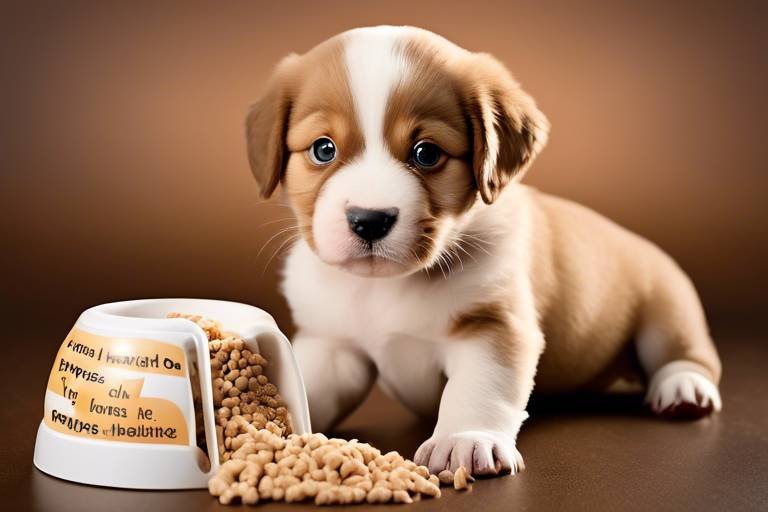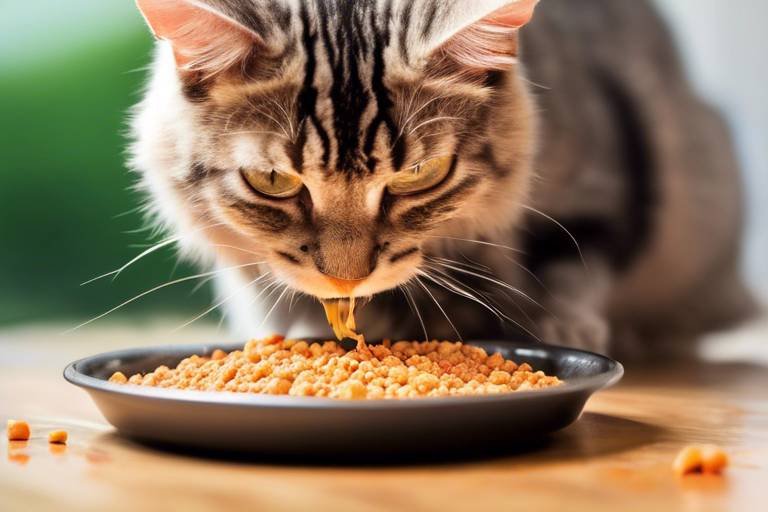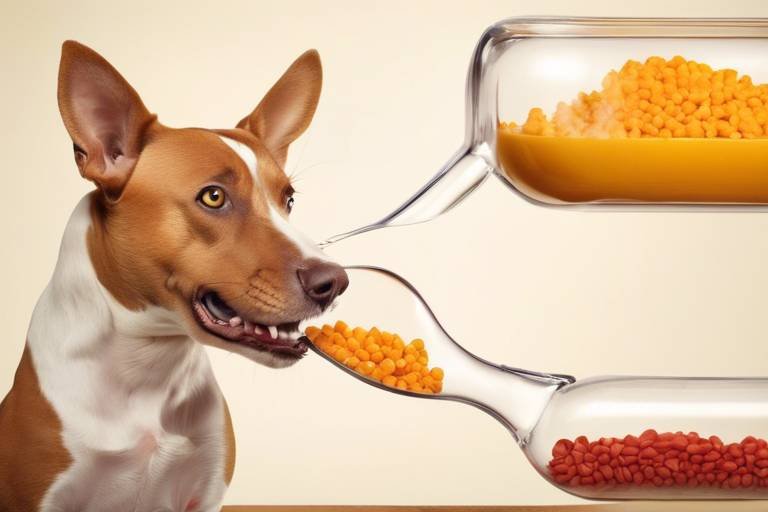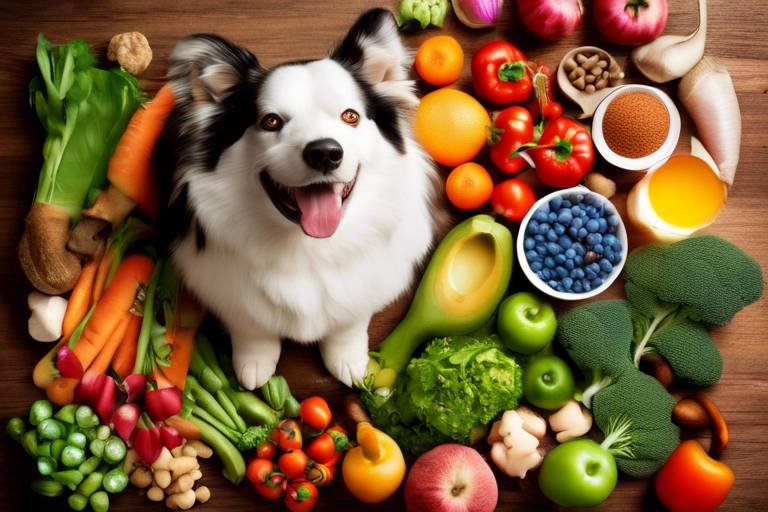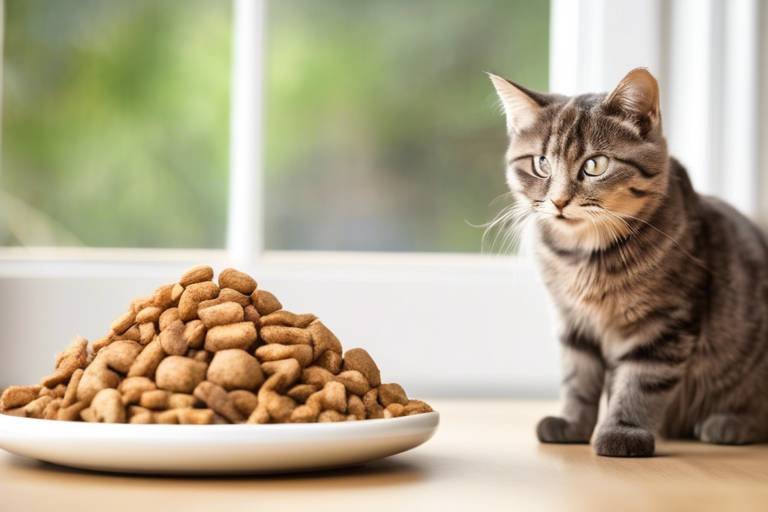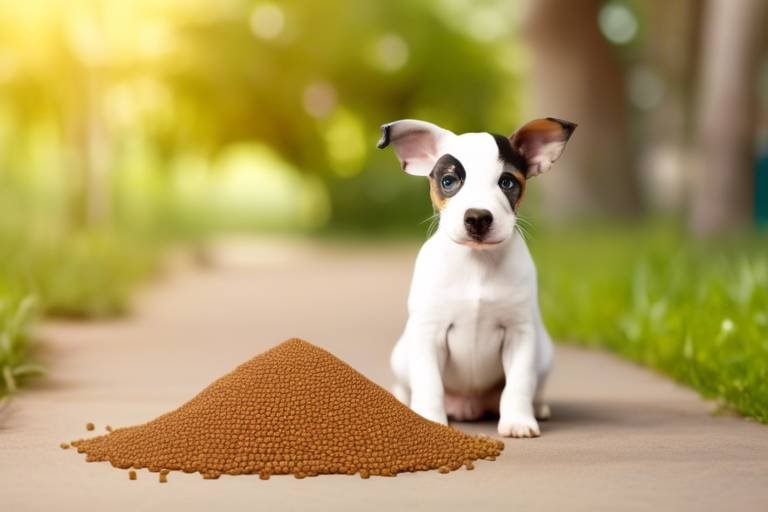How to Help Your Pet with Digestive Disorders
Digestive disorders in pets can be as distressing for them as they are for us as pet owners. Just like humans, our furry friends can face a variety of gastrointestinal issues that can lead to discomfort and health complications. In this article, we will explore various ways to assist pets suffering from digestive issues, offering practical advice, dietary recommendations, and insights into symptoms and treatments to improve their overall health and well-being.
First and foremost, understanding the nature of digestive disorders is crucial. These issues can manifest in several forms, ranging from mild discomfort to severe health concerns. Whether your pet is experiencing occasional stomach upset or chronic digestive problems, knowing how to recognize the signs and respond appropriately can make all the difference. Imagine your pet as a delicate engine; if one part isn’t functioning properly, the entire system can break down. With that in mind, let’s delve deeper into how you can help your beloved companion navigate through these digestive challenges.
Digestive disorders in pets can manifest in various ways. Understanding the symptoms and causes is essential for effective treatment and management of these conditions to ensure your pet's comfort and health. Common causes can range from dietary indiscretion and food allergies to infections and underlying health conditions. Just like us, pets can have sensitive stomachs, and what works for one may not work for another. By keeping a close eye on their habits and behaviors, you can become more attuned to their needs and take proactive steps to help them feel better.
Recognizing the symptoms of digestive disorders is crucial for early intervention. This section outlines typical signs that indicate your pet may be suffering from gastrointestinal problems, helping you take timely action. Some common symptoms include:
- Vomiting: This can range from occasional to frequent and can indicate various underlying issues.
- Diarrhea: Loose or watery stools can lead to dehydration and should be monitored closely.
- Lethargy: A decrease in energy can be a sign that your pet is not feeling well.
- Loss of Appetite: If your pet suddenly refuses food, it might be time to investigate further.
Vomiting and diarrhea are among the most apparent signs of digestive distress. These symptoms can be alarming, especially if they occur frequently. It's essential to monitor the frequency and severity of these episodes. In some cases, they may resolve on their own, but persistent vomiting or diarrhea can lead to dehydration, which is particularly dangerous for pets. When should you seek veterinary help? If your pet exhibits any of the following, it’s time to consult a professional:
- Vomiting more than once in a day
- Diarrhea lasting more than 24 hours
- Presence of blood in vomit or stool
- Signs of dehydration such as dry gums or excessive lethargy
Knowing when to consult a veterinarian is vital for your pet's health. If your pet is displaying severe symptoms or if you have any doubts about their condition, it’s always better to err on the side of caution. A veterinarian can provide a thorough examination and recommend appropriate tests to pinpoint the issue. Remember, your pet relies on you to advocate for their health, so don’t hesitate to reach out for professional help.
For mild digestive issues, certain home remedies can provide relief. Here are a few safe and effective options that may help soothe your pet's upset stomach without immediate veterinary assistance:
- Bone Broth: A warm, soothing broth can help settle an upset stomach.
- Plain Rice and Chicken: A bland diet can be easier on your pet’s digestive system.
- Pumpkin Puree: This natural remedy can help regulate digestion.
Adjusting your pet's diet can significantly impact their digestive health. Consider introducing a high-quality, easily digestible food that meets their specific needs. Consult with your veterinarian to determine the best dietary changes tailored to your pet’s condition. Sometimes, gradual changes can prevent further digestive upset. Think of it as tuning a musical instrument; a slight adjustment can lead to a harmonious outcome.
A proper diagnosis is essential for effective treatment. Your veterinarian will likely perform a series of tests and examinations to identify the specific digestive disorder affecting your pet. This may include blood tests, fecal examinations, and imaging studies. Understanding the diagnostic process can empower you as a pet owner, allowing you to make informed decisions about your pet’s health.
Veterinarians use various diagnostic tests to determine the cause of digestive issues. Some of the most common tests include:
| Test | Purpose |
|---|---|
| Blood Tests | To check for infections, organ function, and overall health. |
| Fecal Exam | To identify parasites or bacterial infections. |
| X-rays or Ultrasound | To visualize the internal organs and detect abnormalities. |
Understanding test results can be challenging for pet owners. However, your veterinarian will help you interpret these results, providing insights into your pet's condition and treatment options. It’s essential to ask questions and ensure you fully understand the implications of the results, as this knowledge will guide you in making the best choices for your pet’s health.
There are various treatment options available for pets with digestive disorders. Depending on the severity and cause of the issue, your veterinarian may recommend a combination of medical and dietary interventions. It’s essential to follow their guidance closely, as each pet’s needs are unique.
Medications and supplements can play a crucial role in treating digestive disorders. Common types of medications prescribed may include anti-nausea drugs, antibiotics for infections, or medications to promote gut motility. Additionally, supplements like digestive enzymes can enhance nutrient absorption and improve overall gut health.
Probiotics can improve gut health and aid digestion in pets. These beneficial bacteria help restore balance in the gastrointestinal tract, making them an excellent addition to your pet's diet. Incorporating probiotics can be as simple as adding a supplement or choosing a pet food that contains these friendly microbes. Think of probiotics as the friendly neighbors in your pet's gut, helping to maintain harmony and balance.
Q: What should I do if my pet is vomiting?
A: If your pet is vomiting, monitor the frequency and severity. If it persists or is accompanied by other symptoms like diarrhea or lethargy, consult your veterinarian.
Q: Can I give my pet over-the-counter medications for digestive issues?
A: It's essential to consult your veterinarian before giving any medications, as some human medications can be harmful to pets.
Q: How can I prevent digestive disorders in my pet?
A: Maintaining a balanced diet, avoiding sudden changes in food, and ensuring your pet does not eat harmful substances can help prevent digestive issues.

Understanding Digestive Disorders in Pets
Digestive disorders in pets can be a perplexing puzzle for pet owners. Just like humans, our furry friends can experience a range of gastrointestinal issues that can affect their overall well-being and happiness. It's important to recognize that these disorders can manifest in various forms, from mild discomfort to severe health complications. Understanding the symptoms and causes is essential for effective treatment and management of these conditions. After all, a happy pet means a happy owner!
So, what exactly are digestive disorders? Essentially, they refer to any condition that disrupts the normal functioning of your pet's digestive system. This can include anything from simple issues like gas and bloating to more serious problems such as inflammatory bowel disease (IBD) or pancreatitis. The digestive system is a complex network that involves several organs, including the stomach, intestines, liver, and pancreas. When any part of this system is compromised, it can lead to a host of uncomfortable symptoms that can leave your pet feeling less than their best.
Some common causes of digestive disorders in pets include:
- Dietary indiscretion: Pets are notorious for scavenging and eating things they shouldn't, which can lead to gastrointestinal upset.
- Food allergies or intolerances: Just like people, pets can have allergies or sensitivities to certain ingredients in their food.
- Infections: Bacterial, viral, or parasitic infections can wreak havoc on your pet's digestive system.
- Stress: Believe it or not, stress can impact your pet's gut health, leading to issues like diarrhea or vomiting.
- Underlying health conditions: Conditions such as diabetes or kidney disease can also affect digestion.
When your pet experiences digestive issues, it can be distressing not only for them but for you as well. Symptoms can range from the obvious, like vomiting and diarrhea, to more subtle signs such as lethargy or changes in appetite. It's crucial to pay close attention to your pet's behavior and health, as early intervention can make a significant difference in treatment outcomes.
In summary, understanding digestive disorders in pets is the first step towards ensuring their health and happiness. By being aware of the symptoms and causes, you can take proactive measures to address any issues that arise. Remember, your pet relies on you to keep them healthy, so don't hesitate to reach out to a veterinarian if you notice any troubling signs!

Common Symptoms of Digestive Issues
Recognizing the symptoms of digestive disorders in pets is crucial for early intervention and effective treatment. Just like humans, our furry friends can experience a range of gastrointestinal problems that can manifest in various ways. It's essential to be vigilant and attentive to any changes in your pet's behavior or health. Some common symptoms that may indicate your pet is suffering from digestive issues include:
- Vomiting: This is often the most noticeable sign. If your pet is vomiting frequently, it could indicate that something is wrong in their digestive system.
- Diarrhea: Loose or watery stools can lead to dehydration and should be addressed promptly.
- Lethargy: A sudden drop in energy levels can be a red flag that your pet is not feeling well.
- Loss of Appetite: If your pet is suddenly uninterested in food, it might be a sign of digestive distress.
- Abdominal Pain: Signs of discomfort, such as whining or excessive grooming of the belly, can indicate gastrointestinal issues.
It's important to note that these symptoms can vary in severity and may not always be indicative of a serious problem. However, if your pet displays any combination of these signs, it’s wise to keep a close eye on them. In some cases, digestive disorders can lead to more severe health issues if left untreated. For instance, persistent vomiting or diarrhea could result in dehydration, which is particularly dangerous for pets.
When observing these symptoms, consider the context. Did your pet eat something unusual? Have there been any changes in their diet or routine? Sometimes, digestive issues can stem from stress or anxiety, much like how we might feel a bit queasy before a big presentation. Understanding the underlying cause can help you determine the best course of action.
In summary, being aware of these common symptoms can make a significant difference in your pet's health. If you notice any troubling signs, don’t hesitate to consult your veterinarian. Early detection and treatment can lead to a quicker recovery and a happier, healthier pet.
Vomiting and Diarrhea
When it comes to our furry friends, vomiting and diarrhea are often the most noticeable signs that something is amiss in their digestive system. These symptoms can be alarming for pet owners, but understanding their implications can help you take the right steps to ensure your pet's health. Imagine your pet's stomach as a delicate ecosystem; when it gets disrupted, everything can go haywire, leading to discomfort and distress.
Vomiting can occur for a variety of reasons, from eating something they shouldn't have to underlying health issues. It’s not just a simple act; it’s a signal that their body is trying to rid itself of something harmful. Similarly, diarrhea is a way for your pet’s body to expel irritants or toxins. It’s like a warning light on your car dashboard—when it flashes, you know it’s time to pay attention!
Both vomiting and diarrhea can lead to serious complications, such as dehydration. Pets, especially dogs and cats, can lose fluids quickly, which can be dangerous. Here are some signs to watch for:
- Dry gums
- Excessive thirst
- Weakness or lethargy
- Loss of appetite
If you notice any of these symptoms alongside vomiting or diarrhea, it’s crucial to consult a veterinarian promptly. They can assess the situation and determine whether your pet needs immediate care or if it’s a minor issue that can be managed at home. Remember, early intervention is key! Just like you wouldn't ignore a check engine light, you shouldn't overlook these signs in your pet.
In some cases, vomiting and diarrhea can be resolved with simple home remedies or dietary changes, but it’s essential to be cautious. If your pet has persistent symptoms lasting more than 24 hours, or if they are experiencing severe vomiting or diarrhea, it’s time to seek professional help. Your veterinarian will likely perform a thorough examination and may recommend diagnostic tests to identify the root cause of the issue.
In conclusion, while vomiting and diarrhea can be distressing for both pets and their owners, understanding these symptoms and knowing when to seek help can make a world of difference. Just like a well-tuned machine, keeping your pet's digestive system running smoothly is vital for their overall health and happiness.
- What should I do if my pet is vomiting? If your pet vomits once but seems otherwise healthy, monitor them closely. If vomiting persists or is accompanied by other symptoms, consult your veterinarian.
- How can I prevent vomiting and diarrhea in my pet? Ensure your pet has a balanced diet, avoid feeding them table scraps, and keep harmful substances out of their reach.
- When is it necessary to take my pet to the vet for these symptoms? If your pet shows severe symptoms, such as lethargy, persistent vomiting or diarrhea, or signs of dehydration, it's crucial to seek veterinary care immediately.
When to Consult a Veterinarian
Knowing when to consult a veterinarian is crucial for your pet's health. If your furry friend is experiencing digestive issues, it’s essential to monitor their symptoms closely. While some digestive disturbances can be managed at home, others may signal a more serious underlying condition that requires professional intervention. So, how can you tell when it's time to pick up the phone and call your vet? Here are some key indicators to watch for:
- Persistent Vomiting: If your pet is vomiting repeatedly over a short period, it’s a red flag. Occasional vomiting might not be a cause for concern, but persistent vomiting can lead to dehydration and other complications.
- Severe Diarrhea: Diarrhea that lasts more than a day or is accompanied by blood can indicate a serious issue. It’s important to seek veterinary care to prevent dehydration and further health risks.
- Loss of Appetite: If your pet refuses to eat for more than 24 hours, this can be a sign of a significant problem. A sudden change in appetite can indicate pain or discomfort that needs to be addressed.
- Abdominal Pain: Signs of discomfort, such as whining, excessive licking of the abdomen, or a hunched posture, should prompt a visit to the vet. These symptoms often indicate that something isn’t right internally.
- Weight Loss: Unexplained weight loss over a short period can be alarming. If your pet is losing weight without a change in diet or activity level, it’s time to consult your veterinarian.
Additionally, if your pet exhibits any of the following symptoms, it’s best to err on the side of caution and seek veterinary advice:
- Signs of dehydration, such as dry gums or excessive thirst
- Fever, indicated by a high body temperature
- Behavioral changes, including lethargy or excessive aggression
Remember, your veterinarian is your best ally when it comes to your pet's health. They can provide guidance tailored to your pet’s specific condition and help you navigate the complexities of digestive disorders. If in doubt, don’t hesitate to reach out. It’s always better to be safe than sorry!
Q: How can I tell if my pet's digestive issue is serious?
A: Look for signs such as persistent vomiting or diarrhea, loss of appetite, abdominal pain, or sudden weight loss. If you notice any of these symptoms, it's best to consult your veterinarian.
Q: Can I treat my pet's mild digestive issues at home?
A: Yes, mild symptoms can often be managed at home with dietary adjustments and home remedies. However, if symptoms persist or worsen, consult your vet for further advice.
Q: What should I feed my pet if they have digestive issues?
A: A bland diet, such as boiled chicken and rice, is often recommended for pets with mild digestive upset. However, consult your veterinarian for specific dietary recommendations based on the underlying condition.
Home Remedies for Mild Symptoms
When your beloved pet experiences mild digestive issues, it can be distressing for both of you. Fortunately, there are several home remedies that can help soothe your furry friend’s upset stomach without the immediate need for veterinary intervention. These natural solutions can be a great first step in providing relief, especially for minor symptoms like slight nausea or mild diarrhea.
One of the most effective remedies is to ensure your pet stays hydrated. Dehydration can quickly become a serious issue, especially if your pet has been vomiting or has diarrhea. Offer your pet fresh water frequently, and consider adding some electrolyte solution designed for pets to help replenish lost fluids and minerals. If your pet refuses to drink, you might try offering ice chips or ice cubes, which can sometimes encourage them to hydrate.
Another helpful remedy is to adjust your pet's diet temporarily. Feeding them a bland diet can work wonders. You can prepare a simple meal of boiled chicken (no skin or bones) and plain white rice. This combination is gentle on the stomach and can help firm up stools. If your pet enjoys pumpkin, adding a small amount of canned pumpkin (not the spiced pie filling) can also aid digestion due to its high fiber content. Just be sure to introduce any new food gradually to avoid further upset.
Additionally, you can consider herbal remedies, such as ginger or peppermint, which are known for their soothing properties. A small amount of ginger root can help alleviate nausea, while peppermint can provide a calming effect on the stomach. However, it's important to consult with your veterinarian before introducing any herbal remedies to ensure they are safe for your specific pet.
Lastly, creating a calm environment can significantly impact your pet's recovery. Stress can exacerbate digestive issues, so provide a quiet space for your pet to relax. Gentle petting and reassuring words can go a long way in making them feel safe and secure. If symptoms persist or worsen, it’s crucial to consult your veterinarian promptly to rule out any serious conditions.
- What are the signs that my pet's digestive issues are serious? If your pet is experiencing severe vomiting, diarrhea lasting more than 24 hours, lethargy, or showing signs of pain, contact your veterinarian immediately.
- Can I give my pet human medications for digestive issues? It is not advisable to give your pet human medications without veterinary guidance, as many can be harmful to animals.
- How long should I wait before seeking veterinary help? If your pet's mild symptoms do not improve within 24 hours or if they worsen, it's best to consult your veterinarian.
Dietary Changes and Recommendations
When it comes to helping your furry friend with digestive disorders, dietary changes can be a game-changer. Just like how we feel better when we eat right, our pets also thrive on a balanced diet tailored to their specific needs. So, what should you consider when adjusting your pet's meals? First and foremost, quality matters. Always opt for high-quality pet food that lists real meat as the first ingredient. This ensures your pet gets the necessary protein to support their overall health.
Moreover, it’s essential to introduce any new food gradually. Sudden changes can lead to more digestive upset, which is the last thing you want for your pet. A good rule of thumb is to mix a small amount of the new food with the old food over a week, increasing the new food's proportion each day. This gradual transition helps your pet’s digestive system adapt without causing further distress.
Another vital aspect is the inclusion of fiber. Fiber is like a broom for the digestive system, sweeping away any stubborn waste and promoting regular bowel movements. You can find fiber in various sources, such as pumpkin, sweet potatoes, and green beans. Adding a spoonful of pureed pumpkin (not the spiced pie filling!) to your pet's meal can work wonders. However, be cautious with the amount you add, as too much fiber can lead to its own set of issues.
Additionally, consider incorporating probiotics into your pet's diet. Probiotics are beneficial bacteria that help maintain gut health and can significantly improve digestion. They can be found in certain yogurts or as supplements specifically designed for pets. Just remember to consult your veterinarian before introducing any new supplements to ensure they are suitable for your pet's condition.
Lastly, hydration is crucial! Ensure your pet has access to fresh water at all times, as dehydration can exacerbate digestive issues. Some pets may also benefit from wet food, which contains higher moisture content and can aid in hydration. If your pet struggles with drinking enough water, you might want to consider adding a splash of low-sodium chicken broth to their water bowl to entice them.
In summary, making thoughtful dietary changes can greatly enhance your pet's digestive health. By focusing on high-quality ingredients, introducing foods gradually, incorporating fiber and probiotics, and ensuring proper hydration, you can help your furry companion feel more comfortable and healthy.
- What are the signs my pet needs a dietary change?
Look for symptoms like vomiting, diarrhea, bloating, or a lack of appetite. If your pet shows any of these signs, it may be time to reassess their diet. - Can I feed my pet human food?
Some human foods, like plain cooked chicken or pumpkin, can be beneficial, but always check with your vet before introducing anything new. - How long does it take to see improvements in my pet's digestive health?
It can take a few days to a couple of weeks, depending on the severity of the issue and the dietary changes made.

Diagnosing Digestive Disorders
Diagnosing digestive disorders in pets is a crucial step toward ensuring their health and well-being. Just like humans, our furry friends can experience a variety of gastrointestinal issues that require careful examination and analysis. Understanding the diagnostic process not only helps pet owners feel more empowered but also ensures that their pets receive the appropriate care they need. When your pet shows signs of discomfort, it’s essential to consult with a veterinarian who can guide you through the necessary steps to identify the problem.
The first step in diagnosing digestive disorders typically involves a thorough physical examination. The veterinarian will assess your pet's overall health, checking for symptoms like bloating, pain, or any unusual behavior that might indicate digestive distress. This initial evaluation is often followed by a detailed discussion about your pet's history, including their diet, lifestyle, and any previous health issues. This information is vital as it helps the veterinarian to pinpoint potential causes of the digestive problems.
In many cases, veterinarians will recommend a series of diagnostic tests to get to the root of the issue. These tests can include:
- Blood tests - To check for signs of infection, inflammation, or organ dysfunction.
- Fecal examinations - To identify parasites or bacterial infections that could be affecting your pet's digestion.
- X-rays or ultrasounds - To visualize the internal organs and detect any abnormalities such as blockages or tumors.
- Endoscopy - A procedure that allows the veterinarian to view the gastrointestinal tract directly and even take biopsies if necessary.
Each of these tests serves a specific purpose, and together they provide a comprehensive picture of your pet's digestive health. Understanding what each test entails can help alleviate some of the anxiety pet owners may feel when faced with a diagnosis. For instance, blood tests can reveal underlying conditions that might not be immediately apparent, while fecal examinations can help rule out common culprits like parasites.
Once the tests are completed, interpreting the results can feel overwhelming. However, it’s important to remember that veterinarians are trained to analyze these findings and provide clarity. They will explain what the results mean in the context of your pet's symptoms and overall health. For example, elevated liver enzymes in a blood test might indicate liver disease, while the presence of certain bacteria in a fecal test could point to an infection requiring treatment.
In summary, diagnosing digestive disorders in pets involves a combination of physical examinations, detailed history taking, and various diagnostic tests. Each step is essential for understanding the underlying issues affecting your pet's digestive system. By collaborating closely with your veterinarian, you can ensure that your beloved pet receives the best possible care tailored to their specific needs.
Q: How can I tell if my pet has a digestive disorder?
A: Look for signs like vomiting, diarrhea, bloating, or changes in appetite. If you notice any of these symptoms, consult your veterinarian.
Q: What should I do if my pet is exhibiting mild symptoms?
A: For mild symptoms, consider home remedies like a bland diet, but always consult your veterinarian for advice tailored to your pet's condition.
Q: Are diagnostic tests safe for my pet?
A: Yes, diagnostic tests are generally safe and are essential for determining the cause of your pet's digestive issues.
Q: How long does it take to get test results?
A: Depending on the tests performed, results can take anywhere from a few hours to several days. Your veterinarian will keep you informed.
Common Diagnostic Tests
When your furry friend is experiencing digestive issues, it’s essential to pinpoint the exact problem to provide effective treatment. Veterinarians employ a variety of diagnostic tests to delve deep into your pet’s gastrointestinal health. These tests not only help in identifying the underlying cause but also guide the treatment process. Here are some of the most common diagnostic tests that may be recommended:
- Physical Examination: This is often the first step. The vet will check your pet's overall health, palpate the abdomen, and look for any signs of discomfort or swelling.
- Blood Tests: A complete blood count (CBC) and biochemistry panel can reveal a lot about your pet's internal health. These tests help identify issues like infections, inflammation, or organ dysfunction.
- Fecal Examination: A simple yet effective test, a fecal examination checks for parasites, bacteria, and other abnormalities in your pet's stool.
- X-Rays and Ultrasound: Imaging tests like X-rays or ultrasounds provide a visual overview of the digestive tract. They help in detecting blockages, tumors, or structural abnormalities.
- Endoscopy: This is a more invasive procedure where a small camera is inserted into the digestive tract. It allows vets to visualize the interior of the stomach and intestines and even take biopsies if necessary.
Each of these tests plays a crucial role in forming a comprehensive understanding of your pet's digestive health. For instance, while blood tests can indicate signs of infection or inflammation, imaging tests can reveal physical blockages that may not be apparent through other means. The combination of results from these tests allows veterinarians to develop a tailored treatment plan that addresses the specific needs of your pet.
After the tests are conducted, interpreting the results becomes the next significant step. Understanding what these results mean can be overwhelming, but it’s vital for making informed decisions about your pet’s care. If your vet discovers any abnormalities, they will discuss the implications and recommend appropriate treatment options, ensuring that your pet gets back to their happy, playful self as soon as possible.
Q: How long do diagnostic tests take?
A: The duration varies depending on the type of test. Blood tests can take a few hours to a day, while imaging tests may take longer, especially if sedation is required. Endoscopy might require a few hours for the procedure and recovery.
Q: Are diagnostic tests painful for my pet?
A: Most diagnostic tests are minimally invasive and cause little discomfort. However, some tests, like blood draws or endoscopies, may require mild sedation to ensure your pet remains calm.
Q: What should I do if my pet shows symptoms of digestive issues?
A: If your pet exhibits symptoms such as vomiting, diarrhea, or lethargy, it’s essential to consult your veterinarian promptly. Early diagnosis can lead to more effective treatment and a quicker recovery.
Interpreting Test Results
Understanding your pet's test results can feel like deciphering a foreign language, but it doesn't have to be overwhelming. When your veterinarian conducts diagnostic tests to identify digestive disorders, the results can provide crucial insights into your pet's health. It's essential to approach these results with a clear mind and a focus on what they mean for your furry friend.
Typically, test results will include a variety of metrics that indicate how well your pet's digestive system is functioning. Common tests include blood work, fecal examinations, and imaging studies such as X-rays or ultrasounds. Each of these tests can reveal different aspects of your pet's gastrointestinal health. For instance, blood tests may show elevated liver enzymes, indicating potential liver issues, while fecal tests can identify parasites or bacterial imbalances.
To help you better understand these results, here are some key components you might encounter:
| Test Type | What It Shows |
|---|---|
| Blood Work | Assesses organ function, detects infections, and identifies inflammation. |
| Fecal Examination | Identifies parasites, bacteria, and food sensitivities. |
| X-rays/Ultrasound | Visualizes the digestive tract to detect blockages, tumors, or abnormalities. |
Once you receive the results, it's crucial to discuss them with your veterinarian. They can explain what the numbers mean and how they relate to your pet's symptoms. For example, if your pet's blood work shows high levels of certain enzymes, your vet might recommend additional tests or treatments to address the underlying issue. Remember, the context of these results is just as important as the numbers themselves.
Moreover, don’t hesitate to ask questions during your consultation. Here are some questions you might consider:
- What do these results indicate about my pet's health?
- Are there any immediate actions we should take?
- What follow-up tests might be necessary?
In conclusion, interpreting your pet's test results is a collaborative process between you and your veterinarian. By staying informed and engaged, you can make the best decisions for your pet's digestive health and overall well-being.
- How long does it take to get test results? - Test results can vary in time depending on the type of test. Blood work may take a few hours to a couple of days, while fecal tests and imaging results can take longer.
- What should I do if I don't understand the results? - Always feel free to ask your veterinarian for clarification. They are there to help you understand your pet's health.
- Can I get a second opinion on test results? - Yes, seeking a second opinion is perfectly acceptable, especially if you feel uncertain about the diagnosis or recommended treatment.

Treatment Options for Digestive Disorders
When it comes to treating digestive disorders in pets, there’s no one-size-fits-all solution. Just like us, our furry friends have unique needs, and understanding those needs can lead to better health outcomes. The treatment options can be broadly categorized into two main areas: medical interventions and dietary adjustments. Each of these plays a significant role in restoring your pet's digestive health and overall comfort.
Medical interventions often begin with a thorough examination and diagnosis from your veterinarian. Once the specific digestive disorder is identified, the vet may prescribe medications tailored to your pet's condition. Common medications include anti-nausea drugs, antacids, and anti-diarrheal medications. For pets suffering from more severe conditions, such as inflammatory bowel disease, immunosuppressive drugs may be necessary. It's crucial to follow your veterinarian's instructions closely and monitor your pet for any side effects that may arise from these medications.
In addition to medications, supplements can also be beneficial. For instance, digestive enzymes can help break down food more efficiently, while specific vitamins and minerals can aid in overall gut health. Always consult your vet before introducing any new supplements to ensure they are appropriate for your pet's particular situation.
Dietary adjustments can be remarkably effective in managing digestive disorders. Often, a veterinarian may recommend a specialized diet designed to be gentle on the stomach and easy to digest. These diets typically contain high-quality ingredients and are formulated to reduce inflammation and promote healing in the gastrointestinal tract. Here are some common dietary changes that can benefit your pet:
- High-Fiber Foods: Incorporating high-fiber foods can help regulate bowel movements and improve overall gut health.
- Low-Fat Diets: If your pet is experiencing pancreatitis or similar issues, a low-fat diet may be recommended to reduce strain on the digestive system.
- Hydration: Ensuring your pet stays well-hydrated is crucial, as dehydration can exacerbate digestive issues.
Moreover, probiotics have gained popularity as a natural way to support digestive health. These beneficial bacteria can help restore the natural balance of gut flora, especially after a course of antibiotics or during times of stress. Adding probiotics to your pet's diet can enhance their ability to digest food and absorb nutrients effectively.
It's important to remember that any changes to your pet's treatment plan should be made under the guidance of a veterinarian. Regular follow-ups can help assess the effectiveness of the treatment and make necessary adjustments. Ultimately, the goal is to help your pet regain their health and happiness, allowing them to enjoy their life with you to the fullest.
1. How can I tell if my pet has a digestive disorder?
Look for symptoms like vomiting, diarrhea, loss of appetite, or lethargy. If these persist, consult your veterinarian for a proper diagnosis.
2. Are there any home remedies for mild digestive issues?
Yes, some pets may benefit from a bland diet consisting of boiled chicken and rice, but always check with your vet first.
3. How long does it take for treatment to show results?
The timeline can vary depending on the specific disorder and treatment plan, but many pets show improvement within a few days to weeks.
4. Can I give my pet over-the-counter medications?
It's best to avoid giving your pet any medications without consulting your veterinarian, as some human medications can be harmful to pets.
Medications and Supplements
When it comes to treating digestive disorders in pets, medications and supplements can be game-changers. Just like humans, our furry friends can benefit from targeted treatments that alleviate their symptoms and promote overall gut health. But what exactly should you consider when exploring these options? Let’s dive into the world of veterinary medications and dietary supplements to understand how they can help your pet.
First and foremost, medications are often prescribed based on the specific digestive issue your pet is facing. For instance, if your pet suffers from inflammatory bowel disease (IBD), your veterinarian might recommend corticosteroids or immunosuppressive drugs to reduce inflammation. Alternatively, if your pet is dealing with gastritis, medications like antacids or proton pump inhibitors can provide much-needed relief by neutralizing stomach acid.
Moreover, there are medications designed to manage symptoms like vomiting and diarrhea. Antiemetics are commonly used to control nausea and vomiting, while antidiarrheals can help firm up loose stools. However, it's crucial to consult your vet before administering any medication, as some treatments may not be suitable for all pets or could interact negatively with other medications they are taking.
Now, let’s talk about supplements. One of the most popular types of supplements for digestive health is probiotics. These beneficial bacteria help restore the natural balance of the gut microbiome, which can be disrupted by factors such as stress, poor diet, or illness. Incorporating probiotics into your pet's diet can lead to improved digestion, reduced gas, and even enhanced immune function. You might find probiotics in various forms, including powders, capsules, or chews, making it easy to find one that suits your pet's preferences.
Another supplement worth mentioning is digestive enzymes. These enzymes aid in breaking down food more efficiently, which can be particularly beneficial for pets with pancreatic insufficiency or those that struggle to digest certain nutrients. By enhancing the digestive process, these enzymes can help alleviate issues such as bloating and discomfort.
To summarize, here’s a quick overview of common medications and supplements that can support your pet's digestive health:
| Type | Purpose | Examples |
|---|---|---|
| Medications | Reduce inflammation, manage symptoms | Corticosteroids, Antiemetics, Antidiarrheals |
| Probiotics | Restore gut microbiome balance | Various brands in powder, capsule, or chew form |
| Digestive Enzymes | Aid in food breakdown | Enzyme powders or capsules |
Always remember, while medications and supplements can significantly help, they should never replace a balanced diet or regular veterinary care. It’s essential to work closely with your veterinarian to develop a comprehensive treatment plan tailored to your pet's specific needs. After all, a healthy gut leads to a happy pet!
- What should I do if my pet experiences side effects from medications? If your pet shows any signs of adverse reactions, such as vomiting, lethargy, or unusual behavior, contact your veterinarian immediately.
- Can I give my pet human probiotics? It's best to use probiotics specifically formulated for pets, as their gut flora differs from humans.
- How long does it take for medications or supplements to work? The time frame can vary based on the specific treatment and your pet's condition; always follow your vet's guidance.
Probiotics for Digestive Health
When it comes to maintaining your pet's digestive health, probiotics are like little heroes working behind the scenes. These beneficial bacteria are essential for a well-functioning gut, and they can make a world of difference for pets suffering from digestive disorders. Imagine your pet's gut as a bustling city; probiotics are the friendly residents ensuring everything runs smoothly. They help break down food, absorb nutrients, and keep harmful bacteria at bay. But how exactly do probiotics work, and how can they benefit your furry friend?
Probiotics can be particularly beneficial for pets experiencing issues such as diarrhea, vomiting, or general gastrointestinal discomfort. They work by restoring the natural balance of bacteria in the gut, which can be disrupted by factors like stress, poor diet, or antibiotic treatments. By introducing these good bacteria, you can help your pet's digestive system recover and function optimally. It's like giving your pet's gut a refreshing reboot!
There are several types of probiotics available, each with unique strains that target specific health issues. Some of the most common strains found in pet probiotics include:
- Lactobacillus: Known for its ability to aid in digestion and improve nutrient absorption.
- Bifidobacterium: This strain helps to maintain the gut barrier and supports overall immune function.
- Enterococcus: Often used to prevent diarrhea and support gut health.
When choosing a probiotic for your pet, it's essential to look for products specifically formulated for animals. Human probiotics may not be suitable and could cause more harm than good. Always consult with your veterinarian before introducing any new supplements to your pet's diet. They can recommend the best probiotic options based on your pet's specific needs and health conditions.
Incorporating probiotics into your pet's diet can be done in various ways. Many probiotic supplements come in the form of powders, capsules, or treats, making it easy to find a method that works for your pet. Some pet owners even mix probiotic powders into their pet's food, ensuring they get the benefits without any fuss. Just remember to start with a small amount and gradually increase the dosage, as sudden changes can sometimes upset your pet's stomach.
In addition to supplements, certain foods are naturally rich in probiotics. Consider adding these to your pet's diet for an extra boost:
- Yogurt: Plain, unsweetened yogurt can be a tasty treat for dogs and cats alike.
- Kefir: This fermented milk drink is packed with probiotics and can be mixed into meals.
- Fermented vegetables: Small amounts of fermented veggies can also provide beneficial bacteria.
In conclusion, probiotics can play a vital role in improving your pet's digestive health. By restoring the balance of good bacteria in their gut, these tiny powerhouses can help alleviate symptoms of digestive disorders and enhance overall well-being. Remember, a happy gut leads to a happy pet!
1. Can I give my pet human probiotics?
No, it's best to avoid giving your pet human probiotics, as they may not be suitable for their digestive systems. Always choose probiotics formulated specifically for pets.
2. How long does it take for probiotics to work?
The time it takes for probiotics to show effects can vary, but many pet owners notice improvements within a few days to a couple of weeks.
3. Are there any side effects of probiotics?
Probiotics are generally safe for pets, but some may experience mild digestive upset when starting. It's always a good idea to consult with your veterinarian before starting any new supplement.
4. How do I know if my pet needs probiotics?
If your pet is experiencing digestive issues such as diarrhea, vomiting, or changes in appetite, probiotics may be beneficial. However, consult your veterinarian for personalized advice.
Frequently Asked Questions
- What are the common symptoms of digestive disorders in pets?
Common symptoms of digestive disorders in pets include vomiting, diarrhea, loss of appetite, bloating, and excessive gas. If you notice any of these signs, it's essential to monitor your pet closely and consult a veterinarian if symptoms persist.
- When should I take my pet to the veterinarian for digestive issues?
If your pet experiences severe symptoms such as continuous vomiting, bloody diarrhea, or signs of dehydration (like dry gums or lethargy), it's crucial to seek veterinary care immediately. Early intervention can prevent more serious complications.
- Are there home remedies I can try for my pet's mild digestive issues?
Yes, for mild digestive issues, you can consider home remedies like offering a bland diet (such as boiled chicken and rice), ensuring they stay hydrated, and using pumpkin puree to aid digestion. However, always consult your vet before trying home remedies.
- How can I adjust my pet's diet to improve their digestive health?
To improve your pet's digestive health, consider incorporating high-quality, easily digestible foods. Gradually introduce new foods, and look for options that include probiotics and fiber, which can help promote better digestion.
- What diagnostic tests do veterinarians use for digestive disorders?
Veterinarians may use various diagnostic tests, including blood tests, fecal examinations, and imaging studies like X-rays or ultrasounds, to determine the underlying cause of your pet's digestive issues.
- How can I interpret my pet's diagnostic test results?
Interpreting diagnostic test results can be complex, but your veterinarian will help explain what the results mean for your pet's health. They will guide you on the next steps and potential treatment options based on the findings.
- What types of medications are commonly prescribed for digestive disorders?
Common medications for digestive disorders include anti-nausea drugs, anti-diarrheal medications, and antibiotics if an infection is present. Your veterinarian will determine the best treatment plan based on your pet's specific condition.
- How can probiotics benefit my pet's digestive health?
Probiotics can help restore the natural balance of gut bacteria, improve digestion, and enhance nutrient absorption in your pet. Incorporating probiotics into their diet may reduce gastrointestinal issues and promote overall gut health.




